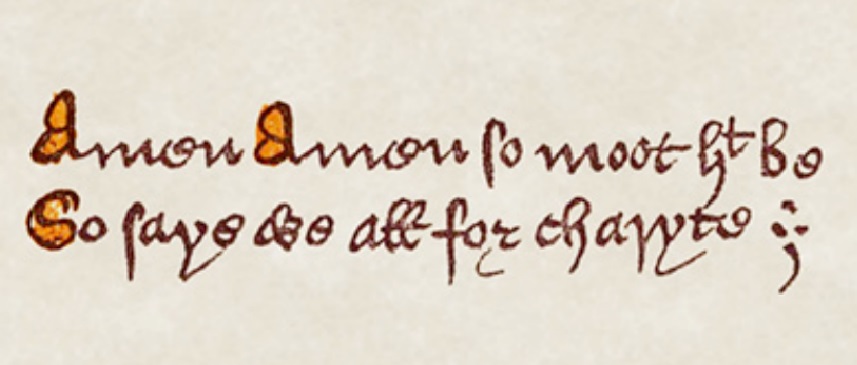“So Mote It Be”

It is customary to end prayers, hymns and verbal obligations with the term “Amen,” a word meaning “So be it”, Amen being a word adopted from Hebrew meaning ‘certainty’ which probably in turn may have taken its rise from the ancient Egyptian “Amon” always the last mention of God of Gods following incantations and prayers. Yet, we Freemasons chant “So Mote It Be” at exactly the time when the uninitiated might expect us to chant “Amen”.
How familiar is this short phrase to we Freemasons? No Lodge is ever opened or closed, in due form, without its inclusion. Yet few know from whence it came, much less the meaning attached thereto. Like so many established and wonderful mysteries, it is so close to us that subsequent to our initial exposure, we no longer question its use and it is thus, seldom discussed.
We find this old, but familiar phrase even in the most antient of Masonic manuscripts, fundamental to our ceremonies. Its simplistic form thus betrays its age and import.
The word ‘mote’ is an Anglo-Saxon word, derived from an anomalous verb, ‘motan’. Chaucer, in his prologue to the Canterbury Tales (c1390), uses the phrase; “The word mote be cousin to the deed” in the same sense in which we use it, ie meaning ‘So May It Be’. It is found in the Regius Poem (c1390), the oldest Craft manuscript in existence and we find it used therein just as we use it today.
As we all of course realise, it is the Masonic form of the ancient “AMEN” which use echoes through the ages. When men have earnestly recounted their most heartfelt prayer and their words still seem but ripples on the bosom of a lake of undelivered syllables, somehow this familiar phrase gathers up all that has been left unsaid and bears our collective yearnings and wishes to the ear of He who comprehends all.
It naturally has a place of respect among us. At the marriage altar it conveys our blessing as young love begins its sojourn toward the mutual promise of conjoined bliss. It steadies the rocking cradle as we dedicate our offspring to new name and new life, entwining its benediction with our most earnest of vows and at the graveside, it unifies its sad repose to that shadowy departure which death alone pronounces upon those whom we have loved.
When, in turn, our end is in sight and having declared our will, for support of our surviving generations we have made our final testament, leaving the remnants of our accumulated wealth to those whom we have loved, we find such dedications completed by that antient legal phrase that bid us repeat thereafter: ‘In the Name of God, AMEN’. Similarly we find the term utilised in pledge loyalty to our monarch.
How impressively it echoes through the Volume of the Sacred Law. We find it in Psalms, as chorus responds to chorus, where, for emphasis it is often repeated.
So too, in the Lodge, at opening, at closing and before any Candidate is enabled to take his next regular step, no Mason ever enters upon any great and glorious undertaking without invoking the aid of the Deity ending his prayer with the ‘Time Immemorial’ phrase, ‘So Mote It Be’.
What, then, is the meaning to us of this old but simple phrase, now so closely interwoven into Masonic lore?
It has two meanings if we be attending Church, or Lodge: Firstly it enforces our unspoken undertaking that His will and word be unquestioningly obeyed.
The other meaning of the phrase is perhaps less transparent but; it is the assent of God to the aspiration of Man: That we can, as men, perhaps bear any trial if we feel that God is with (or within) us. In this sense, God is the confidence within, the beauty to appreciate, the strength to proceed and the wisdom to comprehend. Despite life’s inevitable sorrows and suffering, it teaches us responsibility and control and that we are not to gamble our Fate at the whim of Fortune’s wheel.
The place of Prayer in Masonry is not perfunctory. It is not a mere matter of form and rote. It is both vital and profound. As a man enters the Temple as an initiate, prayer for him is offered to God, in whom he vouches that he already places trust. Later when presented with the crisis of initiation, he must, if his heart so elects, pray for himself.
The faith and spirit of Masonry are underpinned by ceremony . Still later, in a scene which no Mason ever forgets, when the shadow is darkest and the most precious thing that Man or Mason can desire seems lost, in the face of perplexity and despair, prayer is offered. The texts are a prosaical mosaic, in which the grim facts of life and death are set forth in stark reality and appeal is made to the pity and light of the Most High.
And the response of the Brethren to that prayer, as to all others offered, is the old, but now familiar phrase, ‘So Mote It Be!’
Brother do not be ashamed to pray as do your Brethren, in Lodge.
‘SO MOTE IT BE’. . .
![]()
